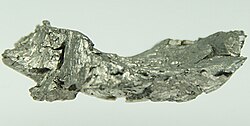Lanthanide
| Atomic No. | Name | Symbol | Picture |
|---|---|---|---|
| 57 | Lanthanum | La | 
|
| 58 | Cerium | Ce | |
| 59 | Praseodymium | Pr | 
|
| 60 | Neodymium | Nd | 
|
| 61 | Promethium | Pm | − |
| 62 | Samarium | Sm | |
| 63 | Europium | Eu | 
|
| 64 | Gadolinium | Gd | |
| 65 | Terbium | Tb | |
| 66 | Dysprosium | Dy | |
| 67 | Holmium | Ho | |
| 68 | Erbium | Er | |
| 69 | Thulium | Tm | |
| 70 | Ytterbium | Yb | |
| 71 | Lutetium | Lu |
A lanthanide is one of a group of 15 elements that have atomic numbers 57 to 71. This is also known as the lanthanide series or lanthanoid series. This group starts at lanthanum and it ends at lutetium.
All lanthanoids are f-block elements, meaning that electrons fill the 4f electron shell, except for lutetium which is a d-block lanthanoid. The lanthanoid series (Ln) is named after lanthanum.
Lanthanides are metals that are related to each other in how they behave. Most of them slowly turn into their hydroxides when they are placed into water, like the alkali metals. They usually form a coating of oxide when placed in the air, like most metals. Lanthanides, with Scandium and Yttrium, are called rare earth elements. All the lanthanoids are silvery white soft metals and tarnish rapidly in air. The hardness increases with increasing atomic number.
Lanthanides are not abundant, and only small amounts are mined. Some have various uses in magnets, superconductors, chemical catalysts, and optical equipment such as lasers.

